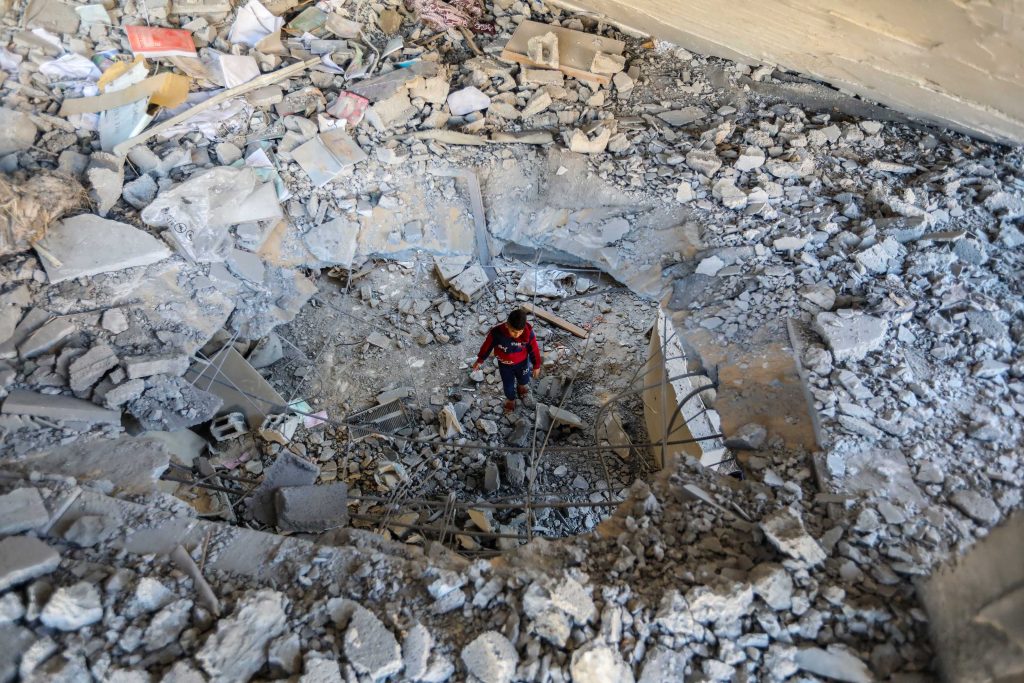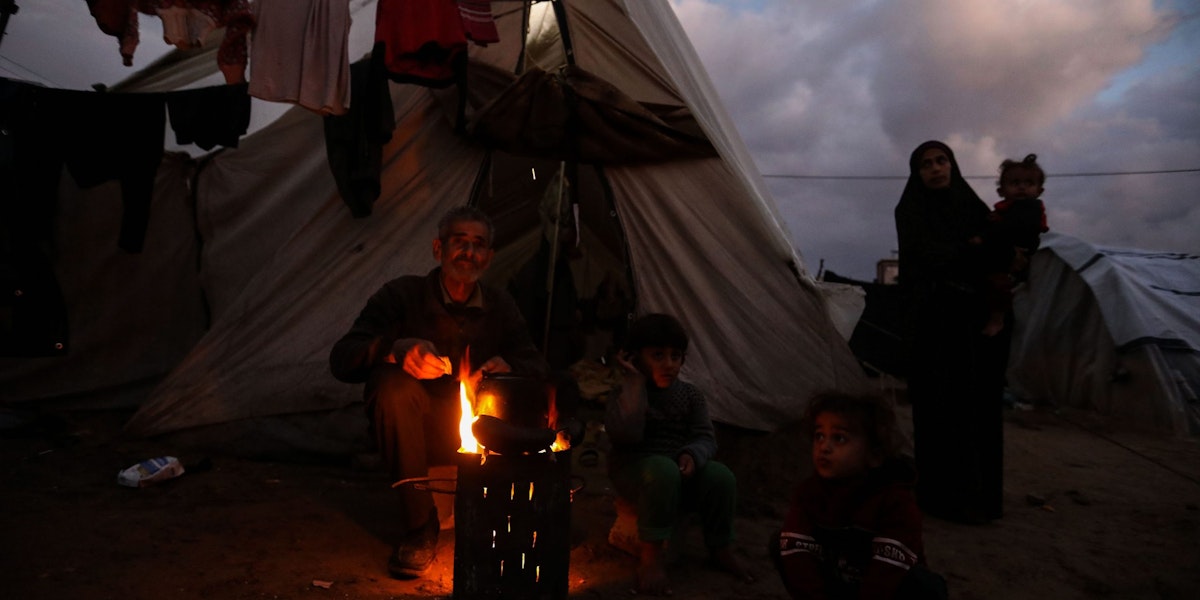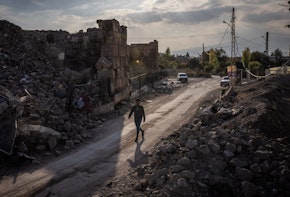The scope and scale of destruction in Gaza beggars the imagination, even in a conflict that has witnessed many punishing cycles. The war in Gaza has entered its fifth month, sparing none of Gaza’s 2.3 million inhabitants. Indiscriminate bombing has made the entire Gaza Strip unsafe, with families displaced multiple times and unable to find a safe haven.
The consequences persist even during pauses in the violence: hunger, illness, and death, environmental destruction, and virtually no hope for political solutions to critical matters like Palestinian statehood. The death toll in Gaza—which Gaza’s Ministry of Health says has surpassed 27,500—has sparked a serious international conversation that until recently would have been unimaginable, about whether Israel is engaging in genocide with U.S. complicity.
In this roundtable—the first of two on the consequences of the Gaza war—Century International fellows address some of the most immediate policy failures raised by the conflict, and at least some possible solutions.

War Is Devastating the Environment
Zeinab Shuker
The ongoing conflict in Gaza is causing significant harm to the environment, which will have long-term consequences for Gazans as well as the region. Recent research shows that the emissions produced in Gaza during the first sixty days after October 7 exceeded the annual carbon footprint of more than twenty of the world’s most climate-vulnerable nations. This is equivalent to burning at least 150,000 tons of coal. The conflict has also destroyed 36 to 45 percent of the buildings in the territory. Rebuilding efforts will be another significant source of emissions, generating at least 30 million metric tons of warming gasses.
These numbers only represent a small snapshot of the total cost of the war on the environment and the population. If we include the total cost of the military operation, such as drone and rocket attacks in the region, and the movement of military assets by other nations like the United States, the reality is much bleaker. Emissions related to military operations are just one aspect of the environmental disaster facing Gaza and the region. The conflict has also destroyed the territory’s outdated water and sewage infrastructure, leading to the pollution of seawater and exposing the vulnerable population to various elevated health risks. Overall, the war in Gaza has produced catastrophic conditions for the environment and for the people of Gaza and the region, making much of the territory all but uninhabitable. The continuation of the military operation is unjustifiable by any measure, including its environmental toll.
 Gaza Must Control Its Own Energy
Gaza Must Control Its Own Energy
Zack Cuyler
On October 9, Israel cut Gaza’s electricity and fuel supplies. The strip receives its power from transmission lines linking it to Israel’s grid, supplemented by a single power plant and by private generators located in homes, schools, businesses, and hospitals—all run by fuel imported from Israel. The cutoff of electricity and fuel plunged Gaza into darkness, disrupted desalination and wastewater treatment, and caused the strip’s main hospitals to cease functioning within a matter of weeks, impeding medical treatment for the massive number of civilians wounded in Israel’s assault. Emergency fuel has trickled in with other humanitarian aid, but the little that has arrived has not been sufficient to keep Gaza’s remaining hospitals operating—much less provide Gazans with light, heat, or clean water.
Israel’s indiscriminate war has rendered Gaza almost completely uninhabitable, and has destroyed virtually every institution that undergirds society.
The denial of civilian access to electricity is a form of collective punishment and constitutes a war crime. Because Israel controls Gaza’s power supply and borders, Israeli leaders can deny this essential service to Gazans at virtually any time. To have meaningful sovereignty, Palestinians must control the energy resources and infrastructures on which they depend. These should include the Gaza Marine offshore natural gas field, which could provide Palestinians with a secure energy supply and significantly reduce dependence on Israel. In this domain as in many others, the world can’t continue to expect Palestinians to live in a state of permanent subordination and insecurity.
 Gazans to Egypt? Not Likely
Gazans to Egypt? Not Likely
Ashraf Hassan
The possibility of allowing Gazans into Egypt in large numbers runs the risk of damaging the public legitimacy of the regime of Abdel Fattah el-Sisi at a time when a severe economic crisis is eroding its standing. The prospect of Egypt being complicit in a “Nakba 2.0” is of course terrible for Palestinians, but it’s also bad politics for Egypt, especially now. On the national security front, there are credible concerns that mass displacement of Gazans into Sinai would mean that Hamas and more radical Palestinian resistance groups would be able to establish a presence in Egypt. This would be a grave security risk for Egypt. With the current levels of national political and economic grievances among the youth, Egypt would be a recruitment prize for these groups. Moreover, the Israeli atrocities in Gaza and the international community’s complicity significantly add to these groups’ recruitment appeal.
Further, if Hamas and other radical groups reestablish operations against Israel from the Sinai, the whole Israel–Egypt peace will be thrown into question. Three scenarios could follow from this. One, Egypt might either allow Israel to operate in Sinai, or two, it might coordinate with Israel in operations against these Palestinian groups on Egyptian territory. But the public would view these two options as high treason, so they are unlikely. The third possible scenario is an even more confrontational posture between Egypt and Israel than currently exists. At stake is the whole peace-security paradigm between Egypt and Israel.
In the end, I don’t think there’s any chance Egypt will accept more than 10,000 or so Gazans, a number that by definition means that the Israeli governing coalition’s goal to depopulate Gaza will not materialize. But even this smaller transfer of Gazans would be politically costly for the Sisi regime, and in return, Egypt will try to extract big economic concessions from Israel’s allies.
 Progress Depends on a Ceasefire
Progress Depends on a Ceasefire
Dahlia Scheindlin
Many near- and long-term Israeli and Palestinian needs and goals are closely linked, and—strange as it may seem—converge on the need for a ceasefire. To reach a long-term comprehensive political agreement, Israel needs political change and Palestinians need rehabilitated governance. But none of these conditions can come about without a ceasefire in the immediate future. A ceasefire will allow the international community to provide extensive support for physical reconstruction and, ideally, political and technical support for a transitional Palestinian leadership.
What are the minimum preconditions for a ceasefire? In the immediate term, the assault on Gazan civilians, displacement, and destruction of civilian infrastructure must end before they result in a mass exodus of Gazans, which will lead to dangerous regional instability. Conditions in Gaza must be stabilized. If a ceasefire is reached, those conditions include: the return of Gazans to the north of the Strip; and a Marshall Plan from Western and Middle Eastern countries to finance humanitarian aid, physical reconstruction, and economic rehabilitation. Israel must not establish itself as the party responsible for humanitarian aid distribution in any permanent way, and definitely not through the Israel Defence Forces, as this could lay a foundation for a future permanent military government. None of these processes will happen without the fundamental bargain of Israeli withdrawal of forces from Gaza, and Hamas disarmament—and those steps, in turn, will not happen absent a long-term political plan for peace. Neither of the parties will initiate these processes; international intervention is essential—through incentives, pressure, participation, and vision.
Eventually, the international community will also need to support a process for Palestinians to choose a representative, unified, accountable, and preferably fresh leadership. A ceasefire could also prompt the collapse of Israel’s extremist government, which raises the likelihood that elections will bring somewhat more pragmatic figures to power. The later elections are held, the more time the current government has to recover from its dismal poll predictions.

 Complicity Weakens America
Complicity Weakens America
Thanassis Cambanis
In addition to displaying numbness to the atrocious human toll of the war in Gaza, American policymakers and President Biden seem to misunderstand the cost of the war to American interests and influence. As the Gaza death toll climbs, it’s harder and harder for American officials to claim that U.S. policy equally values all civilian lives, whether Palestinian or Israeli.
Superpower America is Israel’s indispensable backer. Washington could force the issue on humanitarian aid access, but instead has stood by while Israel blocks aid. The United States could condition aid and withhold weapons, or at least implement existing oversight of arms transfers rather than expediting weapons shipments.
American complicity with Israel’s war carries political and strategic costs as well as moral costs. Domestically and internationally, the United States is struggling to continue its necessary support for Ukraine. Foreign governments, even friends of Washington, are reluctant to be seen siding with the United States on any issue because of the globally unpopular U.S. stance on Gaza. American maneuvers on Israel’s behalf at the United Nations will further weaken international institutions and the rule of law.
Dozens of countries, including many American allies and partners, support South Africa’s genocide case against Israel at the International Court of Justice. Even if the court eventually rules that Israeli war crimes don’t rise to the level of genocide, the case should serve as a wake-up call for the United States that it is directly implicated in an indefensible war.
U.S. officials complain in public and private that the Israelis simply won’t listen to American advice. That claim rings ever more hollow by the day. It’s not that the American government cannot influence Israeli action. It’s simply choosing not to.
 New Urgency for Statehood
New Urgency for Statehood
Dahlia Scheindlin
The greatest obstacles to Palestinian statehood in February 2024 are similar to the greatest obstacles that existed before October 7. First and foremost, the Israeli political leadership is dedicated to preventing Palestinian independence at all costs. Second, the Palestinian leadership is completely divided and has almost no domestic legitimacy. All these obstacles have grown worse since October 7.
However, there is today a greater sense of global urgency for Palestinian statehood than there has been in many years. The devastation in Gaza, the rising violence in the West Bank, and the escalated displacement of Palestinian civilians throughout the territories have sent Western and Middle Eastern actors alike scrambling to de-escalate, while forging new paths to revive a comprehensive political resolution based on Palestinian independence alongside Israel.
 No Palestinian State without Palestinian Life
No Palestinian State without Palestinian Life
Thanassis Cambanis
There’s an untenable disconnect between a policy framework that pretends to pursue a Palestinian state and a reality of unjustifiable and inhumane restrictions on Palestinians. Long ago, the two-state solution became practically impossible, certainly by the time of the Second Intifada and the Israeli embrace of a unilateral security approach in its immediate aftermath.
The United States government is talking about abstract plans for “the day after” in Gaza, with proposals for a Palestinian state in three to five years—fantasy proposals that U.S. officials know will never be implemented.
Only Palestinians can choose their own legitimate political representatives. And Palestinians, ultimately, will accept whether to keep pushing for some kind of state—unlikely to resemble a fully sovereign modern nation-state—or whether to focus instead on equal rights in a “one-state reality,” or in some other of the many possible frameworks that eschew partition.
It’s clear that Israel’s indiscriminate war has rendered Gaza almost completely uninhabitable, and has destroyed virtually every institution that undergirds society, from schools and hospitals to food distribution networks. This destruction is what made South Africa’s genocide case so compelling to the International Court of Justice.
Going forward, life in Gaza will be possible, but inhumane. Palestinians in the West Bank face an accelerated campaign of violence and intimidation. Under these circumstances, the basic Palestinian right to life is under threat. Progressive policymakers should still push to platform Palestinian discussions about statehood, and should still view that goal—a Palestinian state—as indelibly bound up with the fundamental Palestinian right to life.














